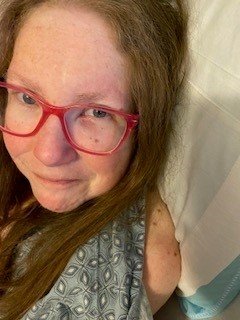Last year, Jessica suffered from two strokes, which developed further insult to an already compromised area of the brain. She has had multiple complications with blood sodium levels registering below 120 or above 160 (standard range is 135-145) which has resulted in numerous and extensive hospitalizations according to her endocrinologist. Out of range sodium levels can cause seizure, coma and can be fatal if not treated with medication and fluid management. The challenge is that there is no FDA approved means of testing sodium outside of a lab or hospital. The only option for home testing is by using hospital grade handheld blood analyzer which can perform a basic metabolic panel which includes sodium and electrolyte testing.
Jessica lives in Summerville, SC, with her mom, Betty, and she enjoys puzzles, games on her phone and traveling, especially to see her two nephews. Her biggest challenge, aside from the recent hospitalizations and sodium issues, is short term memory, which, according to Betty, gets worse every year.
Both Jessica’s endocrinologist and her mother have fiercely advocated for getting a handheld blood analyzer to help with better management of sodium issues. Thanks to the support of our donors, the Raymond A. Wood Foundation provided a device to the family this week.
“Jess still lives with me, and this past year has been a struggle for both of us, “ Betty shared. “We cannot thank you enough for giving us the opportunity to use the equipment! Hopefully this will help keep her out of the hospital!
These handheld blood analyzers are used off-label to manage this condition so costs are not typically covered by insurance, however, having the capability to test sodium at home has proven effective in mitigating lengthy hospital stays. A quick test allows the caregiver and clinician to make fluid and medication changes that are potentially lifesaving. RAWF, in collaboration with partners at Children’s Hospital of Philadelphia and Giner, Inc., is working to make home sodium testing a reality by supporting development of a sodium meter. Read more about this project.
Jessica’s story is an example of the long-term complications many survivors of these tumors face. We at the Raymond A. Wood Foundation work to support survivors and families every step of the way from diagnosis through survivorship. Please support our mission to allow us to provide these devices to families to better manage the care of their loved ones.

